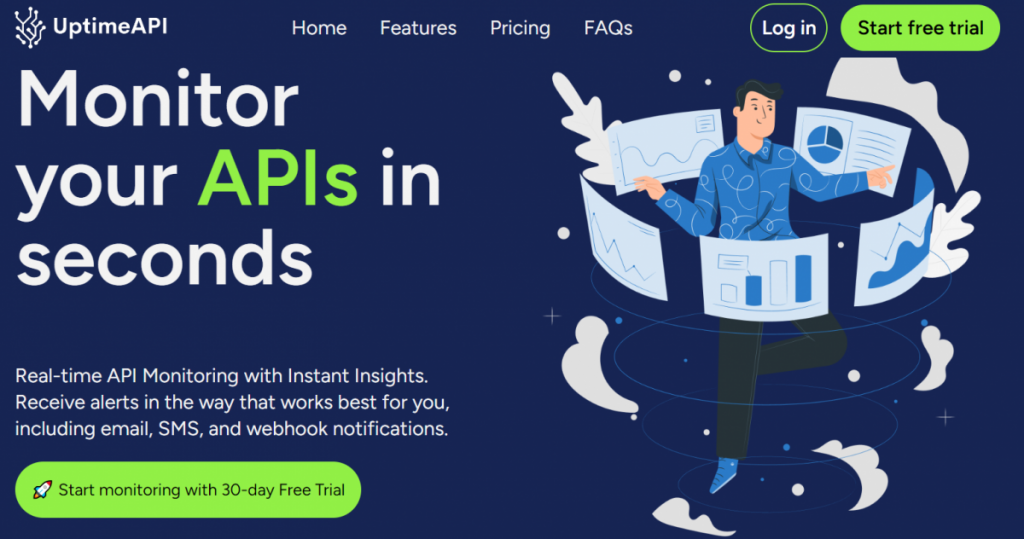In the fast-evolving landscape of software development, APIs (Application Programming Interfaces) serve as the backbone of seamless communication between applications. For developers, ensuring the uptime of APIs is crucial to guarantee the reliability and performance of their applications. Enter UptimeAPI, a specialized tool designed to streamline API uptime tracking and provide developers with the insights needed to keep their applications running smoothly. In this quick guide, we’ll explore the significance of API uptime for developers and delve into how UptimeAPI can be an invaluable asset in this realm.
Understanding the Importance of API Uptime for Developers:

Developers are no strangers to the impact of downtime. In a world where applications are interconnected, relying on APIs for data exchange and functionality, any disruption can have far-reaching consequences.
1. Application Reliability:
- The reliability of APIs directly influences the overall reliability of applications. Developers need assurance that the APIs they depend on are consistently available to deliver the expected functionality.
2. User Experience:
- Downtime leads to frustrated users. Whether it’s a mobile app, a web service, or any other software, users expect a seamless experience. API uptime plays a pivotal role in meeting these expectations.
3. Debugging and Issue Resolution:
- When issues arise, having real-time information on API uptime is instrumental in troubleshooting and resolving problems swiftly. Developers need to identify whether an issue is due to the API itself or another component in the system.
Introducing UptimeAPI:

UptimeAPI is a developer-centric tool designed to simplify the process of API uptime monitoring. It provides developers with actionable insights into the performance of the APIs they integrate into their applications.
1. Easy Integration:
- UptimeAPI offers seamless integration into existing workflows. Developers can quickly set up monitoring for their APIs without significant overhead, allowing them to focus on building and enhancing their applications.
2. Real-time Monitoring:
- Developers can access real-time data on the uptime of their APIs. The platform continuously monitors API endpoints, providing instant notifications in case of downtime and enabling developers to react promptly.
3. Historical Uptime Data:
- UptimeAPI doesn’t just focus on the present. It maintains a historical record of API uptime, allowing developers to analyze trends, identify patterns, and make informed decisions about optimizing their API usage.
4. Customizable Alerts:
- Tailored to the needs of developers, UptimeAPI allows for customizable alerts. Developers can set thresholds for response times or downtime duration, ensuring they are notified only when it matters most.
What Would Be the API Response:
Understanding the API response is fundamental for developers seeking to ensure the reliability and efficiency of their applications.
1. Response Times:
- UptimeAPI provides detailed insights into response times. Developers can analyze how quickly API endpoints respond to requests, helping them optimize performance and enhance user experience.
2. Error Rates:
- Monitoring error rates is crucial for identifying potential issues. UptimeAPI records error rates in API responses, allowing developers to pinpoint and address problems that may arise during data exchange.
3. Payload Analysis:
- The content of API responses matters. UptimeAPI includes payload analysis, enabling developers to scrutinize the data exchanged between applications and APIs, ensuring it aligns with expectations.
4. Scalability Metrics:
- As applications grow, so does the demand on APIs. UptimeAPI offers insights into the scalability of APIs, helping developers anticipate and address challenges related to increased traffic and usage.
Conclusion:
In the dynamic realm of software development, where APIs are the lifeblood of interconnected applications, developers need tools that simplify the task of ensuring uptime and reliability. UptimeAPI emerges as a comprehensive solution tailored to the needs of developers, providing real-time monitoring, historical data analysis, and customizable alerts. By integrating UptimeAPI into their workflows, developers can enhance the reliability of their applications, deliver exceptional user experiences, and streamline the debugging process. Take control of API uptime with UptimeAPI – where developers’ needs meet innovation API Uptime Tracking.
Read More: Company profile APIUsage Cases
